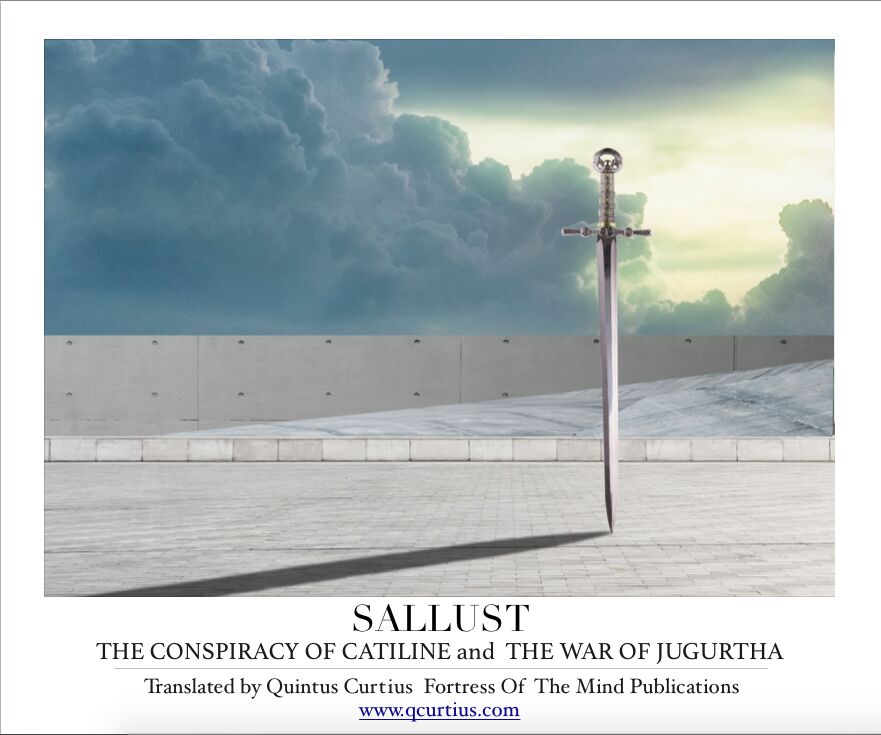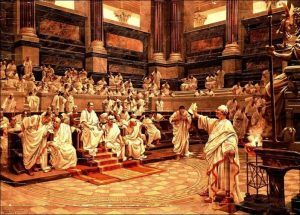
 Men read historical works for many reasons. Sometimes they want to be instructed; at other times, they prefer entertainment. But when a work can combine both of these things in a compelling and evocative style, the reward is that much greater. Caius Sallustius Crispus, known simply as Sallust, is one of those rare historians whose works have achieved a timeless relevance through their matchless balance of entertainment and instruction.
Men read historical works for many reasons. Sometimes they want to be instructed; at other times, they prefer entertainment. But when a work can combine both of these things in a compelling and evocative style, the reward is that much greater. Caius Sallustius Crispus, known simply as Sallust, is one of those rare historians whose works have achieved a timeless relevance through their matchless balance of entertainment and instruction.
Who Was Sallust?
Caius Sallustius Crispus was born in 86 B.C. at the town of Amiternum, which was located northeast of Rome. His family seems to have been of modest means, and he was able to receive a decent education in Rome. We know very little about his early life; but his non-aristocratic origins may provide a clue in explaining the historian’s seething antagonism towards the nobility.
Judging from the accusations of moral looseness made against him by his political enemies, we may guess that he enjoyed himself as a youth. He was fully embroiled in the turbulent—and brutal—factional politics of his era. The end result of his forays into politics was that Sallust was expelled from the senate in 50 B.C. for alleged moral turpitude.

Cicero denounces Catiline in the Roman senate
His star rose with Julius Caesar’s. In 47 B.C.—after the Battle of Pharsalia, the event that clinched Caesar’s victory in the civil war—Sallust was able to return to the senate. From this point his loyal service to Caesar continued to the very end. He went with him to Africa in 46 B.C. to mop up the remnants of Pompey’s forces. Sallust remained there as governor of Numidia when Caesar left. Nevertheless, Sallust’s time in Numidia was marred by controversy; he is said to have engaged in corruption and extortion.
When he returned to Rome about 45 B.C., formal charges were filed against him; the intervention of his patron Caesar apparently saved him from conviction. He retired from public life in 44 B.C. and thereafter devoted himself to literary pursuits. His only completed surviving works are the two historical monographs The Conspiracy of Catiline and The War of Jugurtha.
What Did He Write About?
The Conspiracy of Catiline tells the story of a failed coup d’état by a renegade senator named Lucius Catiline. While we cannot be certain of the year of its composition, a date sometime between 44 and 40 B.C. is probably correct. It is likely that the work was intended for a popular audience that would have hungered for a racy, lurid account of the events leading up to the attempted takeover. But like every great historian, Sallust manages to take a relatively minor episode and elevate it to supreme moral significance. Catiline manages to be both an exciting drama and a supremely relevant study of the pathology of moral corruption.
The War of Jugurtha (Bellum Jugurthinum) is a longer, more complex, and richly layered work. It was probably composed in 41 B.C., but Sallust must have begun collecting source material for the book during his time in Numidia. The work describes the origin and conduct of Rome’s war against the wily Numidian king Jugurtha. Jugurtha is, in some ways, also a sorely neglected manual of counter-insurgency in a North African setting.
What are Sallust’s themes?
The opening passages of both works brilliantly set the tone in a way that really must be read to be believed. Three Sallustian motifs appear repeatedly in his works: moral corruption, fortune, and virtue. He is passionately concerned with the moral decay brought on by excessive wealth. As the prologue to Catiline makes very clear (X-XIII), Sallust believed that the expanding Roman empire’s military acquisitions had set in motion a process of moral corruption and political decay.
But this process of decay could be reversed by implementing the mores and virtues of “our ancestors” (mos maiorum). While fortune seems to have the final say in human affairs (Cat. VIII), it can still be very much influenced by a man’s virtue (virtus). Virtus for Sallust meant manliness, valor, or strength of character. For Sallust, an adverse change in fortune is usually the result of degenerate behavior caused by corrupted morals. If so, then the reverse was also true: a man could turn fortune to his favor by exercising his masculine virtue.
His anger and sorrow at the failure of his countrymen to preserve the character and moral qualities of their ancestors are expressed in the opening chapters of Jugurtha (I—IV). For Sallust, character is everything. Without it, a man is of no consequence; he will forever remain a useful pawn in the service of the rich and powerful.

“Jugurtha’s Table” in Tunisia
His writing style is bold, masculine, rhetorically luminous, and brief. Every sentence, every clause, has a purpose. He does not waste time giving too much background information in his narratives. The rudimentary ethnographic information he gives about North Africa in Jugurtha (XVII—XIX) is only as long as it has to be, and no more. He does not fulminate against or denounce the characters in his histories; he lays out his own value system, describes the actions of the principals, and expects his readers to draw their own conclusions from what they read.
What remain are historical accounts of stark but surpassing beauty. Among the many unforgettable passages in Sallust, the following stand out: the opening paragraphs of both works; the indictment of Roman corruption in Cat. XXXVI et. seq.; the fearsome description of the blood-soaked battlefield in Jug. CI; the fighting death of Catiline and the lamentation of the survivors in Cat. LXI; the brilliant speeches of Caesar, Cato, and Marius; the gyrating spectators of the cavalry battle in Jug. LX; the slaughter of the trapped Roman garrison at Vaga in Jug. LXVII; the fall of Capsa and its brutal aftermath in Jug. XCI; and the strange legend of the Philaeni brothers in Jug. LXXIX. Once read, these passages are never forgotten.
Why Is Sallust So Relevant Today?
Central to Sallust’s worldview was the idea that a man’s character would ultimately determine his fate. Small flaws, over time, could very much become large flaws. He had seen and experienced first-hand how greed, corruption, and self-delusion could prove to be the ruin of men, armies, and nations. Who today, looking at the landscape of current events, can doubt that our culture has paid far too little attention to this eternal truth?
Sallust’s lessons resonate more powerfully today than they ever have, precisely because our culture is literally drowning in hubris, arrogance, and corruption. This was one of the driving forces that let me to publish a new translation of his works that was specifically designed for the modern reader, one that would include detailed footnotes, maps, diagrams, tables, topical charts, and other special features. Unless we wish to follow the same roads to ruin laid out by men like Catiline and Jugurtha, Sallust warns us, we must do our best to master and discipline ourselves. The choice is up to us. Click here to learn more about the book.
Read More: How To Spot Pop Culture Indoctrination

Leave a Reply